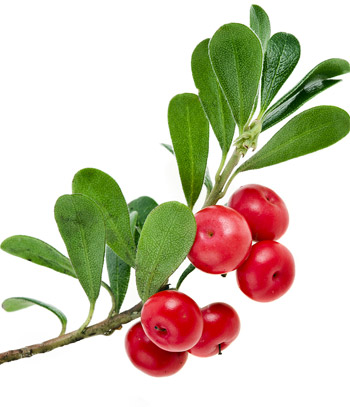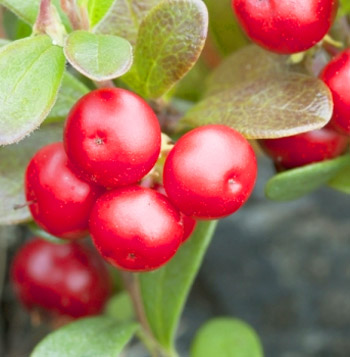|
|
|
 , ,
Font size |
Encyclopedia of Health Benefits of Berries

4. Bearberries:
These are reddish or brown in color. They have many medicinal uses, like its
consumption lowers the uric acid content in the body. It also helps bring
relief from pain due to kidney stones. Herbal tea made from bearberries are
used to cure nephritis.
Bearberry refers to three species of dwarf shrubs, belonging to the genus
Arctostaphylos. However, the bearberry species are adapted to the Arctic and
sub-Arctic climates, unlike the other plant species belonging to the same
genus. Bearberries are distributed in northern North America,Asia and Europe
in a circumpolar way. Alpine bearberry, red bearberry and common bearberry
are the three species known as bearberry. The old English names for
bearberry are Arberry, Bear's Grape, Crowberry, Foxberry, Hog Cranberry,
Kinnikinnick, Mealberry, Mountain Box, Mountain Cranberry, Mountain Tobacco,
Sandberry, Upland Cranberry, Uva-ursi. While the bearberry fruit is edible
and is sometimes used as food, the leaves of the plant are extensively used
for medicinal purposes by herbal practitioners. Read the article to know
more about the health and nutritional benefits of bearberries.
Nutritional and Health Benefits of Eating Bearberry
Bearberry has been used traditionally for bladder treatment in the European
folk medicine. Bearberry tea is a traditional herbal treatment since
centuries in Northern Europe and Eurasia.
Bearberry leaves are known to contain a very powerful antibacterial chemical
compound known as hydroquinones. The compound has been scientifically proven
for its anti-bacterial properties, though the US food and drug
administration has questioned it and the plant is not sanctioned in the U.S.
for medicinal use.
A tea prepared from the dried bearberry leaves has been a traditional
treatment in many parts of the world for urinary tract infections. This
treatment will work best if the patient is on a vegetable-based diet.
Bearberry leaves can also be smoked to get rid of headache. However, using
bearberry in this form is illegal and is carefully regulated in many parts
of the world, as it has a narcotic effect.
Bearberry is also used to make a partially dehydrated decoction, which may
be applied as a pacifier to canker sores, sore gums, burns, and minor cuts.
Folk remedies of many regions of the world suggest the use of bearberry for
effectively treating backaches, rheumatism and arthritis. In some parts of
the world, bearberry is also used as a disinfectant.
Bearberry has been also found to be effective against E. coli, according to
some reports. Preparations made of bearberry have shown promise against
Proteus vulgaris, E. coli, Ureaplasma urealyticum, Mycoplasma hominis,
Staphylococcus aureus, Pseudomonas aerginosa, pneumonia, Enterococcus
faecalis, and Streptococcus strains.
Caution Against Bearberry
Though bearberry is relatively safe, when consumed in large doses may cause
nausea, green urine, bluish-grey skin, vomiting, fever, chills, severe back
pain, ringing in the ears.
Bearberry should not be consumed by pregnant women and breast-feeding women.
It should also not be used for treating children and patients suffering from
a kidney disease.
Drug interactions with diuretics have been recorded, as also with drugs that
make the urine acid.
Therapeutic Uses, Benefits and Claims of Bearberry
Bearberry purportedly gets its name from the fact that the berries seem to
be a favorite food of bears. Uva ursi acts as a natural diuretic. It has
been used historically to treat cystitis, urolithiasis, and other urinary
tract infections.
The Herb Bearberry
 It is a traditional bladder treatment used in European folk medicine. In
northern Europe and Eurasia, bearberry tea has been a traditional herbal
treatment for hundreds of years. It is a traditional bladder treatment used in European folk medicine. In
northern Europe and Eurasia, bearberry tea has been a traditional herbal
treatment for hundreds of years.
Some Native American tribes used an infusion of the stems of bearberry and
blueberry as a way to prevent miscarriage, and aid a woman's recovery after
child birth.
The leaves of uva ursi contain a very powerful and recognized antibacterial
chemical compound known as hydroquinones. This is a scientifically proven
compound, but its use is questioned by the US Food and Drug Administration,
and the plant is not sanctioned for medical use in the United States.
A tea made from a decoction of dried bearberry leaves is a traditional
treatment for urinary tract infections in many parts of the world. Ingesting
bearberry tea works best if the patient is on a vegetable-based diet. It has
been clinically shown to be more effective when the urine is alkaline in
nature.
The uva ursi leaves may be smoked to relieve headache. This form of use is
illegal or carefully regulated in many regions, due to the narcotic effect
of the plant. A partially dehydrated decoction made from bearberry may be
applied as a salve to canker sores, sore gums, burns, and minor cuts. The
folk remedies of many cultures suggest bearberry as an effective treatment
for backaches, rheumatism, and arthritis. It is used as a disinfectant in
some regions, perhaps due to its known attributes as a urinary antiseptic.
Next..
Dated 12 March 2013

|
|
|
|
|
|
|









